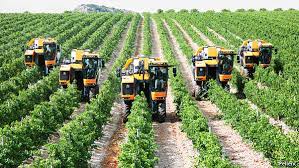On the fringes of the UN climate negotiations on Friday, an additional $9 billion in funding was revealed to address the role of agriculture in the climate issue.
With its debut at the Glasgow climate negotiations two years ago, the United States and the United Arab Emirates launched the Farm Innovation Mission (AIM) for Climate, a joint effort that aims to spend $17 billion on farm and food systems innovation. Roughly one-third of greenhouse gas emissions that warm the world are caused by the food systems, which include all of the activities involved in producing, transporting, and discarding food.
As Earth approaches the Paris Agreement’s aim of keeping warming to 1.5 degrees Celsius (2.7 degrees Fahrenheit) since industrial times, nations have been meeting annually at the Conference of the Parties to debate and negotiate solutions. It’s been simpler for governments and businesses to announce money for initiatives unrelated to the issue of fossil fuel consumption, even as tough negotiations over how vigorously countries might agree to cut their use of them are still ongoing.
The focus on farming at this year’s COP28 summit sets it apart from others. “If we don’t fix our food and agricultural sectors, we will not be able to reach 1.5 degrees,” stated UAE Minister of Climate and the Environment Mariam Almheiri on Friday at a press conference in Dubai.
Herrero stated, “We will need to keep a close eye on that to see if this is mostly greenwashing.”
In the past, the project has supported research to lessen synthetic nitrogen, restored damaged pastureland in Brazil, and built a $500 million agro-processing factory in Nigeria.
The recently awarded projects cover a broad spectrum of topics. Certain initiatives, such as a $500 million action plan on “regenerative agriculture,” are non-definitive and encompass a variety of strategies aimed at motivating farmers to adopt emission-reducing practices. Others concentrate on producing and processing food or on fertilizer and animal feed. The most cutting-edge includes creating microorganisms that can fix carbon in soil and creating microalgae that aid in the onshore growth of oysters from food-grade industrial waste.
Middle-class and low-income nations are the focus of many of the programs, as farmers there frequently lack access to the technologies needed to tackle climate change. While some of the new projects described aim to reduce waste, none specifically focus on reducing consumption. Richer nations consume higher amounts of the foods—like dairy and meat—that account for the great majority of emissions connected to food worldwide.
It’s a good thing, according to Herrero, if the cash aids low- and middle-income nations in both mitigating emissions and adapting to climate change.
“The hard work begins now,” Herrero declared.


















